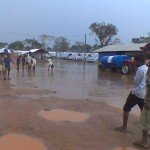Thanks: Groundviews
After first breaking news on Friday, Groundviews continues to receive disturbing photos on the flooding in Menik Camp after last Friday’s torrential downpour. No journalists have been allowed to visit the IDP camp even after the floods.
Key points of situation updates received by Groundviews
Groundviews contributor Vidura’s tweets (available here) are one source of information related to the worsening ground conditions in Menik Camp.Though unverified, shared concerns and points in a number of other reports received by Groundviews indicate,
People detained in Zones 4 and 5 are facing severe hardship. Some reports suggest they have moved in to common buildings like schools and hospitals and that this has in turn created other problems over over-crowding and sanitation.
Roofs of tents have have been blown away by strong winds.
As camps are flooded, vehicles have found it difficult to reach the IDPs with help
Toilet pits are overflowing and whole areas are stinking. Huge concerns over health and sanitation.
For over two days there hasn’t been proper food and water for IDPs in Zones 4 and 5. (Zone 5 is newly built to move number of IDPs camp from Zone where 75,000 are thought to be detained)
Tents in Zones 4 and 5 do not have cemented floors. IDPs are forced to sleep on sandy floors, which of course are now too wet to inhabit.
The RDA, responsible for cleaning the ditches, has not done so for months and is yet to start the work.
All reports concur that tensions within the camps over conditions of internment are rising.
Traditional print media and SMS alert coverage
SMS news services update cricket scores minutes after a vital catch, decisive over or match-winning stroke. 48 hours after the devastating floods, Groundviews has not received even a cursory report of the flooding in Menik Camp via any of the SMS news services it is subscribed to, including JNW and Daily Mirror.
Only Uthayan on Saturday carried a news story on the situation in Tamil. English and Sinhala Sunday newspapers are also revealing in this regard.
Amongst the leading English Sunday newspapers, the Sunday Observer, The Sunday Island and The Nation web versions do not report the crisis in Menik Camp. The Sunday Times has a short front page article. Only the Sunday Leader and Lakbima News headline the situation. The Sunday Leader quotes Jeevan Thiyagarajah, Head of the Consortium of Humanitarian Agencies (CHA) in IDPs swimming in human excreta,
… apart from inadequate sanitation facilities and tents meant for an emergency only would also collapse in the event of heavy rains. “My predictions have been proved right,” he said last evening.
Lakbima News notes in IDPs at drowning point notes that “Minister of Resettlement, Rishard Badhiyudeen, when contacted by this newspaper over the phone for a comment, asked us to “call back in 15 minutes”. But the minister remained “un-reachable” since”. Which is frankly unsurprising.
Sunday Times coverage – high resolution screen grab of website, front page
Lakbima News coverage – high resolution screen grab of website
Sunday Observer coverage – high resolution screen grab of website
Sunday Island coverage – high resolution screen grab of website
The Nation coverage – high resolution screen grab of website
Sunday Leader coverage – high resolution screen grab of website, front page
News over KPs arrest and Police brutality dominate Sinhala newspaper coverage on Sunday.
Divaina goes with the headline “Operation to round up foreign operatives of Tigers begun”. No mention of the dire conditions in Menik Camp. Front page photo here.
Unlike its English counterpart, Lakbima goes with the headline “The Police itself opposes the brutishness of personnel in the service”. No mention of the dire conditions in Menik Camp. Front page photo here.
Rivira goes with the headline “KP had prepared atomic weapons!”. No mention of the dire conditions in Menik Camp. Front page photo here.
The denial of access to cover the humanitarian conditions in IDPs camps by government is, sadly, an excuse for leading traditional media to completely erase a growing humanitarian tragedy from their news coverage. A public ignorant of how bad conditions are in these camps for infants, children, women and men will continue to believe in the outrageous braggadocio of the President and his government, claiming to look after these IDPs without the help of any NGO but unable to even agree when, and in what numbers, they will be released.
Even to help government look after these IDPs, we have a right to know what the conditions on the ground are. Simply covering up this humanitarian tragedy is not a viable response. A State that sees fit to keep hundreds of thousands of civilians in these conditions and is blind to the resulting inhumanity, indignity and violence, is not one capable of peace or reconciliation.






